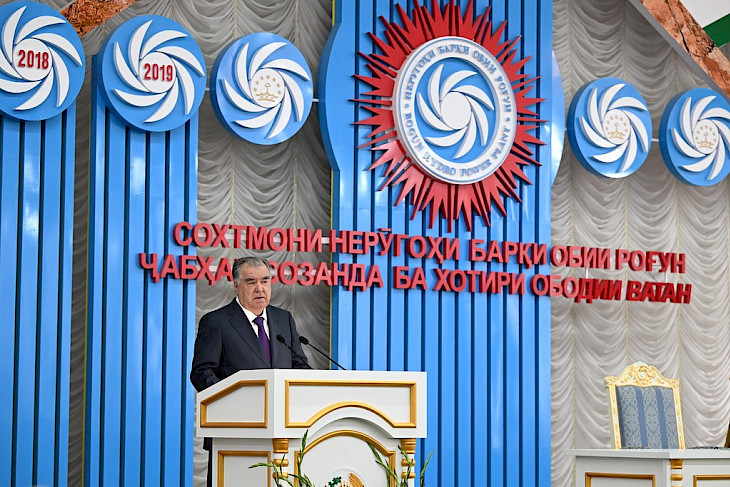The government of Tajikistan is finalizing negotiations with the World Bank for a grant agreement of $650 million to complete the construction of the Rogun Hydropower Plant, President Emomali Rahmon stated during a meeting with the plant’s construction workers, reports Asiaplus.tj.
Negotiations with the Asian Infrastructure Investment Bank for a $500 million loan agreement are also in their final stages.
He reminded that concessional loan agreements have already been signed with the Islamic Development Bank for $150 million and the Saudi Development Fund for $100 million.
"Additionally, decisions to allocate $100 million have been made by other Arab development funds, including the OPEC Fund for International Development, the Kuwait Fund for Development, the Abu Dhabi Fund, and the Savings and Trust Fund of Italy," Rahmon said.
Work is ongoing to attract grant funds from the Asian Development Bank and concessional loans from the European Investment Bank and the Qatar Fund, the President of Tajikistan added.
He emphasized that between 2008 and 2024, the government allocated over 42.5 billion somoni from the state budget and other sources for the completion of the Rogun Hydropower Plant.
Rahmon noted that the Rogun plant has been declared a pivotal project, as the HPP "lays a solid foundation for achieving Tajikistan's energy independence, the country's sustainable economic development, improving the standard and quality of life of the people, and the prosperity of the homeland."
He stated that since 2018, the two initial units of the plant have generated 7.5 billion kilowatt-hours of electricity.
Currently, more than 17,000 workers and engineering-technical staff are involved in the construction of the hydropower plant, an increase of 3,000 people compared to 2023.
Since the resettlement of the population from the flood zone began approximately 12 years ago, 3,212 families have been relocated from the Nurabad district and the city of Rogun, Rahmon reported.
"These families were resettled in the cities and districts of Dangara, Rudaki, Faizabad, Tursunzade, Rogun, and Nurabad, provided with new permanent housing and household plots of land. Living conditions in the new settlements, the construction of residential homes, auxiliary buildings, and the social issues of these families are under constant supervision," the President assured.
Other measures are also underway to prepare the flood zone—moving power lines, dismantling substations, communication lines, and roads. In particular, within the framework of the construction of the Rogun-Obigarm-Nurabad highway, which is currently progressing rapidly, roads from the right bank flood zone are being relocated to the territory of Rogun and Nurabad district.
"In connection with the implementation of the next phase of construction, particularly raising the dam to 1,185 meters and flooding the reservoir, the population resettlement plan for 2021-2025 must be implemented on time," the head of state pointed out.
He instructed the relevant agencies involved in the resettlement process to carry it out "at a high level," including assisting displaced persons in finding jobs, organizing vocational training courses for them, and allocating land plots to resettled families to establish dehkan farms.
To ensure the timely completion of the hydropower plant, President Rahmon instructed strict adherence to the work schedule. The Ministry of Finance of Tajikistan was directed to timely allocate funds for the payment of completed works, purchase of construction materials, equipment, and fuel.
The Committee for Architecture and Construction was instructed to strengthen the quality control of construction work within the framework of contracts and ensure timely state expertise of proposed projects.
Rahmon noted that the installation of the next hydropower unit is planned for the fall of 2026.
"In this process, coordination of work to raise the dam to 1,150 meters in August 2026 and to 1,175 meters in August 2027 must be strictly monitored. The construction of a 920-meter bridge over the hydropower plant's reservoir must also be accelerated," Rahmon indicated.
The Communications Service, together with other relevant organizations, was instructed to ensure the timely relocation of the fiber-optic communication line from the flood zone. The country's Ministry of Transport was tasked with completing the Rogun-Obigarm-Nurabad road construction project on time.
CentralasianLIGHT.org
September 30, 2024

